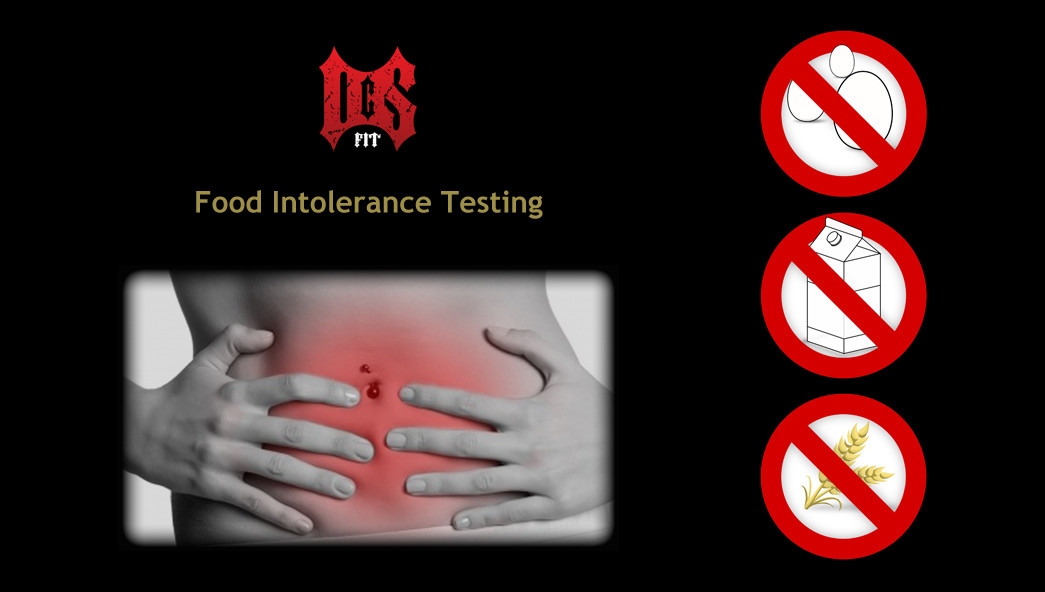Food Intolerance Testing
At DCS we look to provide every resource possible to ensure your results reflect the efforts you put in. With that in mind, we are now offering on site food intolerance testing.
What are food intolerances?
There is a lot of confusion about the terms food intolerance and food allergy, and the differences between them. Many people think they have a food allergy when their symptoms can sometimes indicate food intolerance instead. Up to 45% of the population suffer from food intolerance* which, whilst not life threatening, can have a negative impact on many aspects of daily life.
When foods and drinks are digested the proteins within them are broken down into smaller fragments for easy absorption into the body. Larger fragments can pass through without breaking down, and sometimes the body reacts to them as invaders, attacking them using antibodies called Immunoglobulin (IgG). This can cause inflammation and a wide range of symptoms including headaches, digestive problems, IBS, bloating, itchy skin, joint pain, weight gain and low mood to name a few.
*According to the leading medical charity Allergy UK
Food intolerance testing can play a pivotal role in ensuring you get the best results from the effort you are putting in at the gym or via your nutritional approach. Some foods that are considered ‘healthy’ or ‘clean’ may be having effects on your system that are holding back your progress.
To combat this we have provided a nutritional program that looks to cut all ‘high risk’ items from your diet and ensure you are still nurturing your body in the right way. However, with this plan we are simply playing to the odds, but that doesn’t cover every possible eventuality and there may be low risk items in your nutrition plan that you remain intolerant to.
Having blood work done removes the doubt. It’s also a shortcut to finding out the answers (though I’d still recommend the cleanse approach in order to actually ‘feel’ the impact these foods are having on your system and ensuring a balanced approach that keeps your system correctly nurtured). Don’t worry, there are no needles involved it’s just a little pin-prick on your finger, nothing more. The results can be quite dramatic and useful at all levels.
Someone who has experienced this and is a huge advocate of the testing approach is Paula Radcliffe
Her test came back informing her she was intolerant to egg, chicken, wheat, tomatoes and dairy.
“After I cut these foods out of my diet, I was able to run without doubling up in pain. I have a lot more energy and I am back to my normal self. It truly made such a difference to my life and I would recommend it to anyone else suffering from symptoms like these.“
As soon as Paula started to cut her trigger foods out of her diet she noticed a difference instantly and she was able to function normally again. Paula was able to continue training and her performance improved, going on to achieve the world record!

Paula Radcliffe
Olympian & Women’s Marathon World Record Holder
Most people though are not competing at Olympic levels, but the effects can be much more straight forward and make dramatic effects on your physique changes as well as how you feel in general.

Matt Perry, 40, a Personal Trainer from Kent was looking to lose weight and improve his energy levels when he took a Lorisian food intolerance test in May 2014. He was also having trouble sleeping which was affecting his ability to focus on everyday tasks.
Matt’s test revealed some surprising and unexpected reactions to wheat, yeast, soya, milk, egg white & yolk, crustacean mix, lentils, peanuts, mustard seed, grape. Faced with such a large list, he was understandably daunted.
After committing to the dietary changes and replacing the foods identified in the blood test, Matt started to feel the benefits straight away.
“When I first got my results I was at first shocked that my staple food groups were the things I was intolerant to.“
“Nearly 5 weeks on and I feel amazing. I have lost over an inch from my waist and lost 17lbs in weight. My energy levels through the day are higher; I am more focused and clear headed.“
As well as seeing positive changes to his body composition, Matt also realised improvement in his athletic performance after adhering to his new diet.
“In my first triathlon of the season I knocked 17 minutes off my time from last year…A simple test and re-education on your eating habits can turn your life around.
The number of symptoms that can be treated through eliminating foods that cause intolerances might surprise you.
But the results speak for themselves. An Independent Customer Survey conducted by Allergy UK (2007), carried out on 5,286 people – the results were then divided into patient groups and the findings are summarised here.
| Main Medical Condition Reported | % of People Who Reported Moderate to High Benefit |
|---|---|
| Gastro-Intestinal e.g. IBS, Bloating, etc | 80% |
| Respiratory e.g. Asthma, Breathing Difficulties, Rhinitis | 72% |
| Neurological e.g. Migraine, Headaches | 78% |
| Dermatological e.g. Eczema, Acne Psoriasis | 76% |
| Musculo-Skeletal e.g. Arthritis, Rheumatism | 64% |
| Psychological e.g. Depression, ADHD, Panic Attacks | 81% |
| Others e.g. Lethargy, General Feeling of Malaise | 79% |
Another success story is Siodine Price:
Siodine Price suffered with typical IBS symptoms, as well as the inability to lose weight. Despite changing her diet, focusing on five small meals a day including lean proteins, salads and vegetables, Siodine was still frustrated with her lack of progress.
On the recommendation of a colleague, Siodine decided to take a food intolerance test through YorkTest
So that’s what it does, how do you get it and what are the options?
It’s all very simple, there are 4 testing levels. Each test will test for more food types than the previous.
If you want to be sure of the details, we recommend the highest level. Simply because it refines the information. Where the Lorisian 50 will test for 50 different food types, it keeps some of those in batches, so you could go for that option and then just eliminate everything in the batch if it comes back as a red flag. For example, it will test for all nuts as a batch. You may only have issues with one type of nut, but you won’t know that with this test, however, if you just eliminate all nuts that will cover you.
Once you have your test it will take around 10 days to get the results back from the laboratory. Once we have them we will invite you back in to go through them. You will receive a full breakdown of all your tested food types, colour coded for easy reference. You will receive a booklet outlining foods you may need to look out for when trying to avoid certain food types and offering alternatives for you to consider as a replacement. Plus a consultation with our in house nutrition expert Mark, who will take you through the results and discuss any issues or queries you might have.
Here’s the breakdown of the costs:
Tests 50 foods
£115
Tests 75 foods
£155
Tests 100 foods
£195
Tests 156 foods
£300
We will discount all ‘Dynamic’ DCS gym member tests by £10
Non members are welcome, just book in or email to inquire or request the service.
We have limited testing kits on site at any given time, so if you are certain you want the test done, it is best to notify us in advance so we can be sure to keep you a kit aside or order more.
Remember, this is a one time cost. Whilst intolerances can change over time, it’s not as if this is a monthly cost and it is something you should be able to track by yourself after you’ve had the test.


